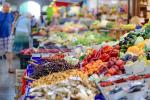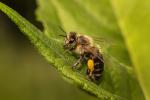Horizon Europe ZeroF Project: Development of verified, safe, and sustainable PFAS-free coatings for food packaging and upholstery textile applications
- Type Project
- Status Signed
- Execution 2023 -2025
- Assigned Budget 4.998.888,5 €
- Scope Europeo
- Autonomous community Cataluña
- Main source of financing Horizon Europe 2021-2027
- Project website https://doi.org/10.3030/101092164
Commonly used in the textile industry, per- and polyfluoroalkyl substances (PFAS) are associated with health concerns that must be addressed. In this context, the EU-funded ZeroF project will develop safe and sustainable by design (SSbD) coating alternatives to replace PFAS compounds in the food packaging and upholstery textile value chains. SSbD coatings will have limited water absorption capacity, high oil/grease resistance for packaging, and high water/oil repellency for textiles. The project will use renewable raw materials and non-toxic compounds and improve process efficiency by replacing PFAS with cellulose fatty acid esters for packaging and silane-based organic-inorganic hybrids for textiles. ZeroF includes three work streams: food packaging, upholstery textiles, and SSbD analysis (covering safety, environmental, economic, and social aspects). The project is halfway through its completion, and the results of the extensive work carried out with the synthesis of organic-inorganic polymers/complexes and the derivation of biomaterials are currently being tested with application-specific requirements.
The main improvements over the current state of the art have been: Development of water-based Ormocer systems, which could be used in the textile industry, where the industry has moved away from solvents due to safety and environmental reasons. Improvement of Ormocer properties to better match the properties of PFAS. This would allow textile and garment manufacturers to replace PFAS-based systems with less harmful alternatives. Development of new modified polysaccharides and coating formulations. The information developed has given the project team valuable insight into structure-property relationships and has allowed us to increase the performance of the coatings, without increasing the cost or placing an additional burden on the environment.
ZeroF details a series of sophisticated experimental activities and notable advances in the field of biomaterial solutions. The primary focus has been on the synthesis of bio-based and organic-inorganic complexes, as well as various bio-based waxes. This work aimed to elucidate the intricate relationships between coating conditions and properties, along with the evaluation of coating manufacturability. A notable achievement includes the development of a bio-based coating system using polysaccharide fatty acid esters. This system was explored through a variety of polysaccharides, fatty acid chains, and degrees of substitution to optimize its performance. In the area of hybrid organic-inorganic coatings, progress has been made in formulating water-based solutions that are compatible with textile end-uses and in developing new solutions that enhance hydrophobicity and oleophobic performance. This advancement is crucial for improving the safety, sustainability, and functionality of coatings. ZeroF emphasizes collaborative efforts with partners, and in the project, we have paid special attention to sharing information and materials among partners. For example, in the packaging sector, the workflow has provided several batches of the established coating system for further development and application in textile coatings and vice versa.
Furthermore, the exploration of biowaxes in wet processes has been instrumental in understanding their performance characteristics, both in coating applications and wet additions. At laboratory scale, good hydrophobicity and oleophobic performance have been achieved for textiles with contact angles comparable to PFAS systems, and application-specific testing is underway. On the packaging side, new powder coating setups have been established, and laboratory results are very promising for water vapor and the Cobb test. Further developments are underway to ensure a good oil barrier, as well as KIT results. In addition, at ZeroF, we have initiated the first iteration of the consortium's implementation of the Safe and Sustainable by Design (SSbD) framework. This initiative is of great importance for policy development, as it supports key action plans such as the Green Deal, the Chemicals Sustainability Strategy, Zero Pollution, and the Circular Economy.
ZeroF develops safe and sustainable by design (SSbD) coating alternatives to replace PFAS compounds in the food packaging and upholstery textile value chains. The developed coatings will have limited water absorption, high oil/grease resistance for packaging, and high water and oil repellency for textiles. We propose developing coatings from precursors at reasonable prices so that the final product remains below the targeted 20% increase compared to current alternatives. To achieve the environmental impact target of >25% improvement, we utilize renewable raw materials, nontoxic compounds, and improve process efficiency. PFAS are replaced by two chemicals: cellulose fatty acid esters for packaging and silane-based organic-inorganic hybrids for textiles. The project includes three work streams: food packaging, upholstery textiles, and SSbD analysis.
Both food packaging and textile workflows follow a similar path (chemical development, formulation, coating, and validation). SSbD analysis actively analyzes data regarding environmental impacts (Life Cycle Assessment, Life Cycle Costing, and Environmental Footprint) and toxicology (e.g., hazard and law, Green Toxicology principles). Computational methods are employed to model the toxicology and performance of the developed chemicals in silico, to reduce in vitro testing, and to generate tools for the certification and standardization process. The certification and regulatory roadmap are developed to identify future regulatory needs and knowledge gaps. SSbD models are developed within the EC-suggested framework to easily adapt to other sectors beyond the project scope. The consortium consists of a combination of industrial and research partners capable of covering the textile packaging and coatings value chains, including end-users.
ZeroF develops safe and sustainable by design (SSbD) coating alternatives to replace PFAS compounds in the food packaging and upholstery textile value chains. The developed coatings will feature limited water absorption, high oil and grease resistance for packaging, and high water and oil repellency for textiles. We propose developing coatings from reasonably priced precursors, with an estimated cost of approximately €0.2–0.4/m² for the final product, which meets the target increase of 20% compared to current alternatives. To achieve the environmental impact target of more than 25% improvement, we utilize renewable raw materials, non-toxic compounds, and improve process efficiency. PFAS are replaced by two chemicals: cellulose fatty acid esters for packaging and silane-based organic-inorganic hybrids for textiles.
The project includes three work streams: food packaging, upholstery textiles, and SSbD analysis. Both the food packaging and textile workflows follow a similar process (chemical development, formulation, coating, and validation). SSbD analysis actively analyzes data related to environmental impacts (Life Cycle Assessment, Life Cycle Costing, and Environmental Footprint) and toxicology (e.g., risks and legislation, Green Toxicology principles). Computational methods are used to model the toxicology and performance of the developed chemicals in silico, reduce in vitro testing, and generate tools for certification and standardization processes. A certification and regulatory roadmap is developed to identify future regulatory needs and knowledge gaps. SSbD models are developed within the framework suggested by the EC to facilitate their adaptation to other sectors beyond the scope of the project. The consortium is composed of a combination of research and industrial partners capable of covering the entire value chains of textile packaging and coatings, including end users.
As the EU prepares to tighten regulations on per- and polyfluoroalkyl substances (PFAS) in 2026, the race is on for safer alternatives. ZeroF brings together 12 research and industry partners from nine countries, coordinated by Finland's leading research center VTT. Its goal is to develop safe and sustainable PFAS-free coatings for food packaging and upholstery textiles, while maintaining the beneficial properties of traditional coatings. "We need solutions that perform as well as PFAS, without the risks," says Miika Nikinmaa, Biomaterials Solutions Leader at VTT. "The industry needs to quickly adapt to upcoming regulations to ensure safety and performance are not compromised." Frameworks and Results ZeroF uses the Joint Research Centre's (JRC) Safe and Sustainable by Design (SSbD) framework method to develop materials, optimize formulations, and assess safety, performance, and sustainability. This approach ensures that the coatings developed are effective, environmentally friendly, safe, and compliant with regulatory standards. The project focused on creating hybrid organic-inorganic coatings for textiles and advanced barrier solutions for molded packaging. Researchers have improved the water resistance of PFAS-free textiles and are exploring innovative chemistry to enhance oil repellency.
So far, the team has made significant progress in developing PFAS-free coatings for textiles and packaging, including a product called ORMOCER®, and carbohydrate fatty acid ester-based coatings that demonstrate excellent water and oil resistance. ZeroF has eliminated harmful solvents, replaced hazardous catalysts, and optimized formulations with advanced additives and polymers to ensure robust performance and safety. Spray and powder coating techniques have been refined to support industrial-scale production. Life cycle assessments and consumer surveys offer insights into sustainability and market potential, supporting the real-world application of ZeroF’s innovations. Collaborative Efforts Replacing PFAS is not easy, and achieving strong water and grease repellency while keeping costs reasonable was a key challenge. ZeroF aims to reduce environmental impact by 25% and keep cost increases for consumers below 20%. Furthermore, gaps in safety data for PFAS alternatives and the limited applicability of existing assessment tools complicated the research process. "The lack of comprehensive safety data made it difficult to fully evaluate PFAS alternatives," Nikinmaa notes. "We needed a more robust database to guide development and establish regulatory compliance."
ZeroF's success so far is also due to its collaboration with other EU-funded initiatives, such as BIO-SUSHY, PROPLANET, and TORNADO. Participation in ECOSYSTEX also provides a valuable network for sharing knowledge, while close cooperation with SSbD networks, such as IRISS, maintains alignment with the principles of safety and sustainability by design at every stage of development. A Safer Future: Newly developed barrier coatings are on their way to commercial production, particularly in the molded packaging sector. In textiles, researchers are refining oil and chemical resistance to expand applications to areas such as protective clothing. To further raise awareness, a dedicated campaign will be launched in 2025 highlighting the benefits of PFAS-free solutions. "It's not just about regulations; we want consumers and businesses to understand why it's important to switch to safer alternatives," adds Nikinmaa. This will culminate in a final event in October 2025, where the project's findings will be showcased and pave the way for wider adoption. When the project concludes in December 2025, the final phase will explore biodegradability for packaging applications and sustainable end-of-life solutions for textiles to prevent long-term environmental damage. This ensures that safer alternatives are accessible and practical for widespread adoption.
- TEKNOLOGIAN TUTKIMUSKESKUS VTT OY
- ASSOCIACIO AGRUPACIO D'EMPRESES INNOVADORES TEXTILS
- E. CIMA SA
- TEMAS SOLUTIONS GMBH
- IDEACONSULT LIMITED LIABILITY COMPANY
- FRAUNHOFER GESELLSCHAFT ZUR FORDERUNG DER ANGEWANDTEN FORSCHUNG EV
- LGI SUSTAINABLE INNOVATION
- LUXEMBOURG INSTITUTE OF SCIENCE AND TECHNOLOGY
- ALMA MATER STUDIORUM - UNIVERSITA DI BOLOGNA
- ACONDICIONAMIENTO TARRASENSE ASSOCIACION
- YANGI AB
- KEMIRA OYJ
- CORDIS project factsheet (pdf)
- Updated Dissemination and Communication Plan
- Ethics Plan, Dissemination and Communication Plan
- Report on the safe and sustainable methodological framework by design
- Report on the mapping of regulatory, certification and essential requirements
- Data management plan
- TEKNOLOGIAN TUTKIMUSKESKUS VTT OY website
- E. CIMA SA website
- FRAUNHOFER GESELLSCHAFT ZUR FORDERUNG DER ANGEWANDTEN FORSCHUNG EV website
- LGI SUSTAINABLE INNOVATION website
- LUXEMBOURG INSTITUTE OF SCIENCE AND TECHNOLOGY website
- ALMA MATER STUDIORUM - UNIVERSITA DI BOLOGNA website
- Tarrasa Air Conditioning Association website
- KEMIRA OYJ website
- https://www.kemira.com







